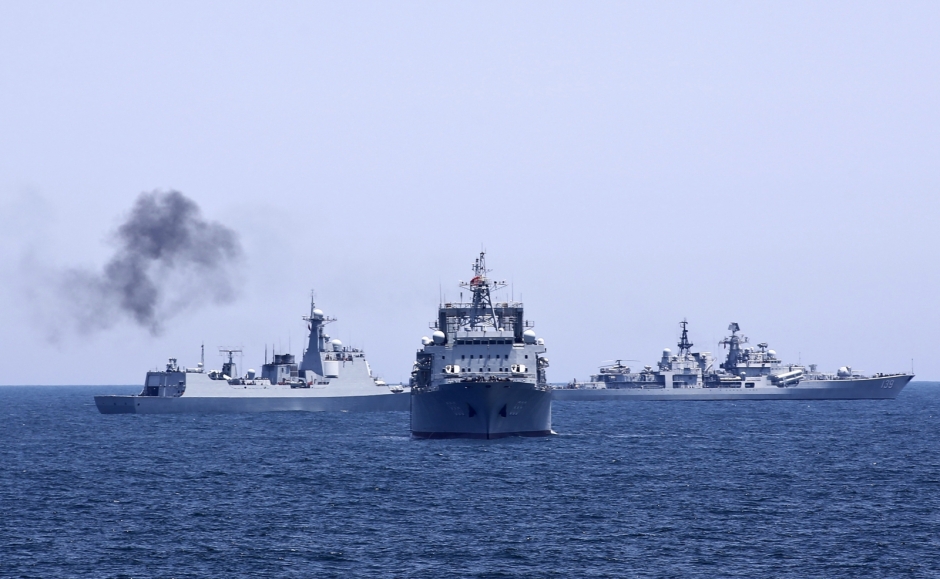On Sept. 20, for the first time in history, two Chinese warships docked at Iran’s principal naval port of Bandar Abbas, in the strategic Strait of Hormuz, the gateway for at least 20 percent of the world’s oil and gas shipments. The ships are taking part in four days of joint naval exercises. One of the vessels, the Changchun, is a guided-missile destroyer.
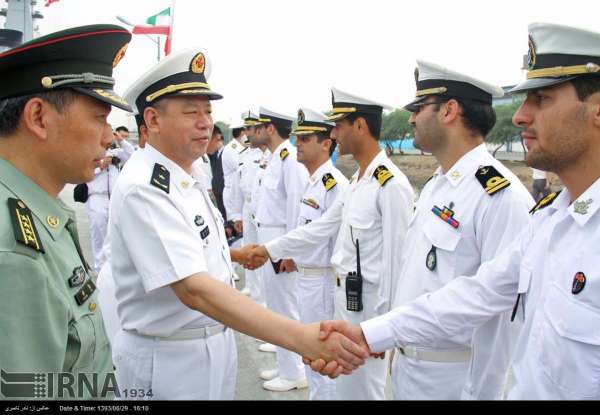
A Chinese fleet commander, Rear Admiral Huang Xinjian, remarked that the visit was intended to “deepen mutual understanding, and to enhance exchanges between our two countries’ navies,” according to The New York Times.
This should not really come as a surprise, given China’s ever growing presence in international affairs, which is now reaching the Middle East.
As Walter Russell Mead noted in his article “The Return of Geopolitics,” in the May-June 2014 issue of Foreign Affairs, “China, Iran, and Russia never bought into the geopolitical settlement that followed the Cold War, and they are making increasingly forceful attempts to overturn it.”
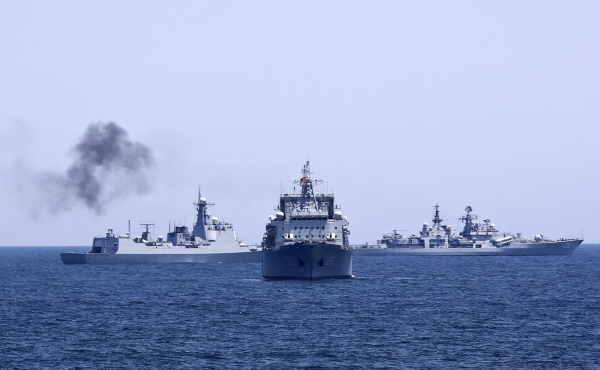
In November 2013, immediately after the announcement that Iran had reached an interim deal with Western negotiators concerning its nuclear program, China’s former ambassador to Tehran, Hua Liming, greeted it favorably. China is a member of the P5+1, the five permanent United Nations Security Council members, plus Germany, who have been in talks with Iran in an attempt to broker a nuclear agreement.
Why was he pleased? Perhaps because he thinks that Iran’s program has reached a stage where it will be impossible to prevent the country from becoming a nuclear power.
And China has helped make this possible. With regularity, officials in Asia have confiscated shipments of equipment and materials sold by Chinese state enterprises to Iranian companies in contravention of international treaties and UN rules, including components and parts for nuclear weapons.
In 2005, seven Chinese firms were suspected of selling nuclear weapons technology and all seven had sanctions placed upon them. They were banned from trading with the United States for two years.
China has also enabled Tehran to withstand pressure from the international community. China is the biggest purchaser of Iranian oil, surreptitiously evading American sanctions by paying in gold and in Chinese currency. Iran uses much of the profit to buy Chinese products.
And when Western countries imposed sanctions against Iran due to concerns over its nuclear program, Chinese oil companies were able to win bids for developing large oil fields in Iran. So the negotiations over the Iran nuclear issue have ensured desirable results for China.
China has now emerged as Iran’s top trading partner, and trade between Tehran and Beijing totaled $40 billion in 2013. Chinese firms are investing in various sectors in Iran, including steel, mines, transportation, agriculture, oil, gas, and the petrochemical industry.
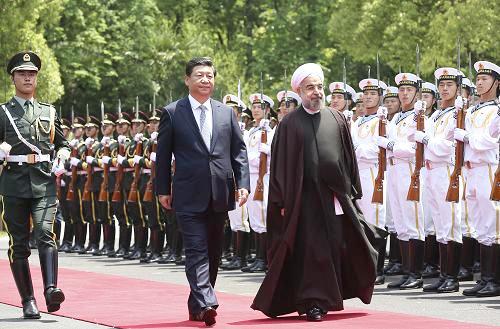
China and Iran have had more frequent interactions recently. Iranian President Hassan Rouhani held in-depth meetings with Chinese President Xi Jinping at the Shanghai Cooperation Organization Summit in May.
They announced they would promote cooperation in all fields to a new high. Xi stressed that China is willing to continue its efforts for an early, comprehensive and proper settlement of the Iranian nuclear issue.
This past April, Iranian Deputy Foreign Minister Morteza Sarmadi met with the outgoing Chinese ambassador, Yu Hongyang, to confer about stronger economic ties, the semi-official Iranian Fars News Agency reported.
“China attaches a lot of importance to the reinforcement of ties with Iran as an important and trustworthy partner,” Yu stated. “There are vast potentials for continuing the upward trend of the two countries’ ties in all the various fields,” he added.
These high-level exchanges demonstrate Iran’s approval of China’s position on the Iranian nuclear issue.
Yet at the same time, Beijing’s relations with Iran’s arch-enemy, Israel, are also flourishing.
Starting secretly during the 1980s but with increasing openness after the establishment of official ties in 1992, arms sales at first defined Sino-Israeli relations. Israel became China’s second-largest weapons supplier.
In fact, during the 1990s, American officials accused Israel of illegally providing China with weapons such as the Patriot missile, the Lavi jet fighter, and the Phalcon airborne radar system.
The arms trade seems to have levelled off, though in 2012 Israel appointed Matan Vilnai, a former major general, as its ambassador to China. Today, though, China is more interested in acquiring Israeli technology. Cyber-security is just one cutting-edge field, along with drones, in which Israel excels and where China wants to improve.
China is also interested in many technologies where Israel is considered a world leader, such as water recycling, desalination, agriculture, and health and medicine.
China is Israel’s third-largest trading partner globally, and its biggest trading partner in Asia. The two-way trade volume has increased from only a little more than $50 million in 1992 to more than $10 billion in 2013.
In April, outgoing Israeli President Shimon Peres paid a three-day visit to China aimed at bolstering economic and diplomatic ties between the two countries, as well as reinforcing the mutual commitment to combat the spread of non-conventional weapons in the Middle East.
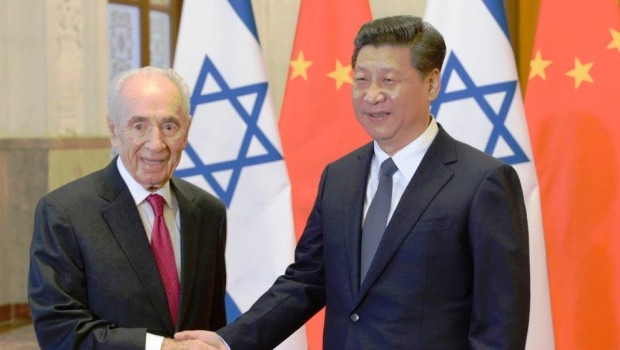
“China is both a regional and a global power and relations between us have strategic significance,” Peres said. “In terms of the diplomatic aspects there are issues of critical importance on the agenda. China is increasing its interest in the Middle East and we have a mutual interest to promote peace and stability, to tackle the scourge of terrorism and the proliferation of non-conventional weapons.”
Peres was referring to the threats China faces from terrorism and extremism, among the Uighurs in Muslim Xinjiang.
Prime Minister Benjamin Netanyahu has made relations with China a priority. In May 2013, he led a large delegation to China, meeting with top political and business officials and agreeing with his counterparts to establish a task force to improve trade ties.
In turn, Chinese Foreign Minister Wang Yi visited Israel last December. He told his hosts that the Chinese and Israeli economies “are highly complementary, and the mutually beneficial cooperation between us enjoys a very bright future.”
Israel has tried to rebrand itself as the “Start-up Nation” — a center of dynamic commercial innovation and economic development — in China’s eyes, and it seems to be working.
Henry Srebrnik is a professor of political science at the University of Prince Edward Island.

